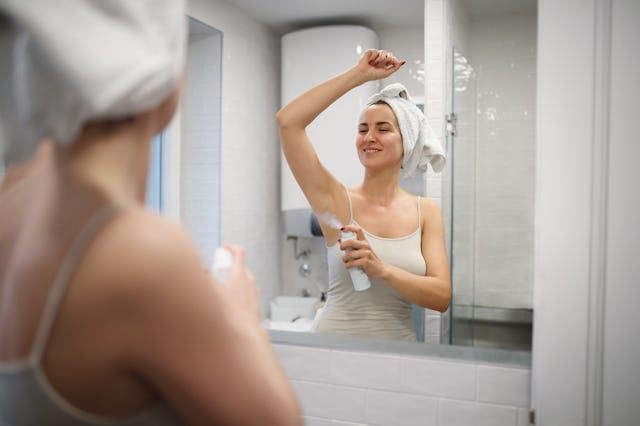How To Wash Your Armpits The Right Way If You Want To Banish B.O. (Yep, There’s A Wrong Way)
If you’ve been feeling extra ripe lately, you may need to freshen up your armpit-washing routine.

For all the joyous things that warm weather brings, one we could live without is sweat — particularly armpit sweat, which not only feels uncomfortable as hell but can bring with it some pretty unpleasant odors that might have you low-key spiraling about your own hygiene. Such fears will probably only be compounded by the revelation that you might be washing your armpits wrong. Yep, how to wash your armpits depends on several factors, some of which require specific products and methods to really keep armpit odor at bay.
Of course, it's worth pointing out from the jump that sweating is an absolutely normal bodily function… though when you're feeling sticky and smelly, this knowledge is likely of little comfort to you. Aside from finding a deodorant and/or antiperspirant that helps keep you feeling fresh throughout the day, you might want to step up your shower game to help banish underarm B.O. Allow a dermatologist to help you out here.
What is body odor, anyway?
First things first: Don't feel embarrassed if you've been smelling a little ripe. It can happen to anyone, and it's nothing to be ashamed of. As Dr. Geeta Yadav, board-certified dermatologist and founder of FACET Dermatology, tells Scary Mommy, there are many causes of B.O. "To understand how body odor forms, you have to know how you sweat," she says. "There are two types of sweat glands — eccrine glands, which are all over your body and produce that thin, watery sweat that evaporates quickly (like the sweat that forms on your brow on a hot day), and apocrine glands, which are concentrated in areas with many hair follicles, like the armpits and groin."
Yadav continues, "Sweat that comes from apocrine glands is different — it not only is believed to be associated with stress sweat, but contains fats, proteins, and sugars that make it thicker than eccrine sweat. Bacteria thrives in dark, damp environments — areas like armpits or the groin — and can feed on the fats, proteins, and sugars in the apocrine sweat. As the bacteria breaks down the keratin protein on the surface of your skin, body odor forms."
Your diet can also impact body odor since certain foods (like onions and garlic) contain compounds that your body can't break down, so they're released through sweat instead, says Yadav. And while it's all pretty normal and natural, she adds that unusual or sudden changes in B.O. "could signify diabetes, kidney failure, and other serious concerns, so be sure to visit your primary care physician to ensure body odor is not a symptom of something significant."
How should you wash your armpits?
So, back to the task at hand: effectively washing your pits. If you’ve just been doing a quick soap-and-water pass, it might be time to call in reinforcements. The MVPs of this lineup? Products and methods that eliminate bacteria.
Assuming you're working with your average, run-of-the-mill B.O., there are some solid bacteria-reducing methods to help tackle armpit odor at the source, especially if your current swipe of soap or body wash just isn't cutting it anymore. "I'd recommend using a body wash that features a chemical exfoliant like glycolic, lactic, or mandelic acid," says Yadav. "These ingredients will remove the dead skin cells on the surface that bacteria like to feed on and sweep those microbes down the drain."
One important tip, per Yadav: "You should not use these types of products after shaving as they could cause irritation — reserve them for your initial cleanse, then use another product for shaving."
Also, hair is prone to trapping bacteria, so if you find that your armpit hair is adding to the problem, Yadav says you should "concentrate on cleansing at the root to ensure you're targeting the area where bacteria thrives best" — i.e., spend about 30 seconds per pit to work the cleanser into your skin thoroughly.
Many natural products can help, too, if you're not a fan of traditional body washes or have particularly sensitive skin. Yadav recommends diluting witch hazel with water when you need a quick refresh. "Using naturally antimicrobial ingredients will absolutely help stave off B.O.-causing bacteria, but not all are ideal to use directly on skin if not diluted as they can be highly irritating," she says. For example, "Some witch hazel formulas contain alcohol, which can be sensitizing for some, so be sure to do a patch test first."
When should you check in with a doctor?
If you're upping your antibacterial game and still find an unbearable stench, check in with your doctor or a dermatologist, who can help rule out other health conditions, such as hyperhidrosis (aka excessive sweating). If sweating is limited to your armpits, Yadav notes that "Botox (which temporarily reduces sweat gland activity) and MiraDry (a device that permanently destroys the glands) can help limit your sweat production, thus inhibiting excess body odor."
Yadav says dietary changes can also help, such as cutting out red meat and other bacteria-boosting foods like garlic, onions, and the like. Still, your doctor can help you pinpoint the exact cause and help you find the solution that works best to ensure sweat-free, pleasantly smelling pits.
Expert Source:
Dr. Geeta Yadav, board-certified dermatologist and founder of FACET Dermatology
This article was originally published on